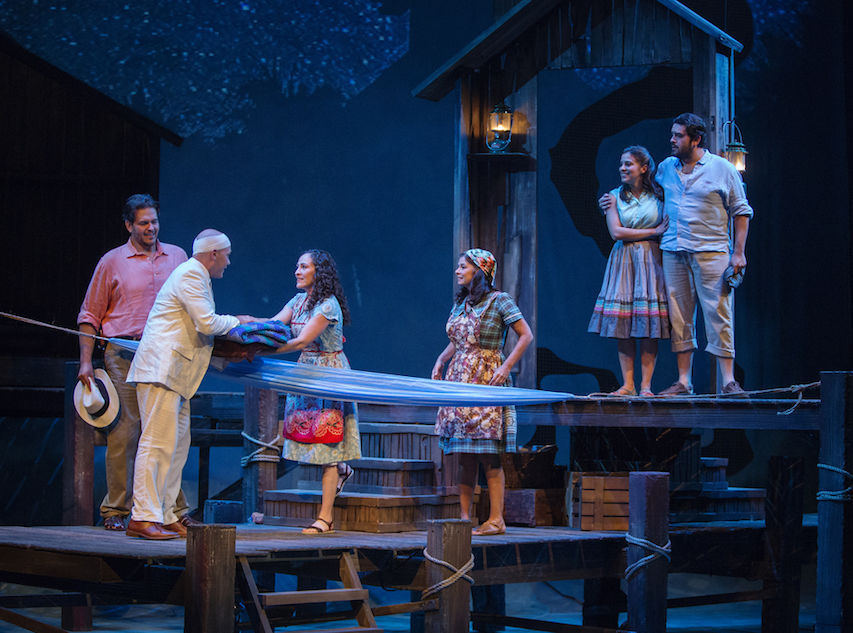“That is why love is for the bold. You have to be willing to risk everything to get what you want.” — Belmira in “The River Bride”
There is great boldness in “The River Bride,” Arizona Theatre Company’s current offering.
And great fear.
This dark, poetic fairy tale by Marisela Treviño Orta is a mesmerizing story incorporating the magic of the Amazon, a Brazilian myth and the consequences of living too fearfully, as well as too free of fear.
That myth says if a strange man appears in your village in June, beware — it may be one of the Amazon’s pink river dolphins. Once a year during that month, dolphins come ashore in the shape of a man determined to seduce the women.
In Orta’s version of the myth, two sisters live with their parents in one of those villages. One June day, their father, a fisherman, pulls a man out of the murky river. He is handsome, dressed in white and has a bandage around his head.
Belmira is 16 and entranced. He looks wealthy, he is mysterious and she’s not married yet — though in two days she is set to marry Duarte, a man her 18-year-old sister Helena had always thought would be her husband.
But it is Helena that the man, Moises, cannot take his eyes off. She is just as smitten.
Yet, she is a cautious woman. And she has heard the stories about the river dolphin’s transformation. It makes her wonder about that bandage that Moises will never remove. Does it hide the head hump dolphins have, she wonders.
This 90-minute play is thick with atmosphere; you practically feel the dampness from the river. Director Kinan Valdez shaped a production that is full of seductiveness and rhythm, and he never lost sight of Orta’s riveting storytelling.
And a solid cast delivered that story.
Sarita Ocón’s Helena carried the injury of lost love, as well as the fear that a broken heart can launch, with authority. Her transition from a young woman full of regrets to one full of hope and then back to regrets was seamless.
Hugo E. Carbajal made Moises’ charm genuine — it was easy to see why both Helena and Belmira were enchanted by him. He has just three days to win Helena’s heart, and Carbajal wears the character’s intensity and fever with an honesty that allowed the audience to buy into the story.
Paula Rebelo has perhaps the most difficult role in Belmira, who must go from a giddish and girlish bride-to-be to a young woman full of disappointment, but still foolishly confident in her bold choices. Rebelo was less successful portraying the pre-disappointment Belmira. You had the sense she was acting rather than being. However, she was completely believable as the young girl who has had a dose of sour reality but is still willing to risk everything to get what she wants.
There was an electricity between Leandro Cano and Dena Martinez in the roles of the girls’ parents, who met one June and quickly married. The role of Duarte, the man set to marry Belmira, is a less developed one, but Sean Burgos gave him enough depth to make us care.
There were three more characters in “The River Bride” — the set by Regina Garcia, and the lighting and projections by David Lee Cuthbert.
The set transitions from a dock on the river to a room in a shack, to a river with a boat moving slowly through it. Behind it, projections give the sense of rain falling furiously, a river moving languidly, a jungle that gives birth to flowers and lightning that seems to swallow the sky.
The set, lighting and projections together kept shifting our senses. One moment, elements looked flat, as though they were in two dimensions, and then would shift quickly to a three-dimensional world full of life and movement. They underscored the real-not-so-real aspects of the story.
“The River Bride” is deceptively simple, as all good fairy tales are. And also like all good fairy tales, there are lessons to be learned, this one about the courage to love and the danger in thoughtless love.
Orta is a young playwright with an enormous capacity to tell moving, vivid stories. “The River Bride,” which won her ATC’s 2013 National Latino Playwright Award, is proof of that.





